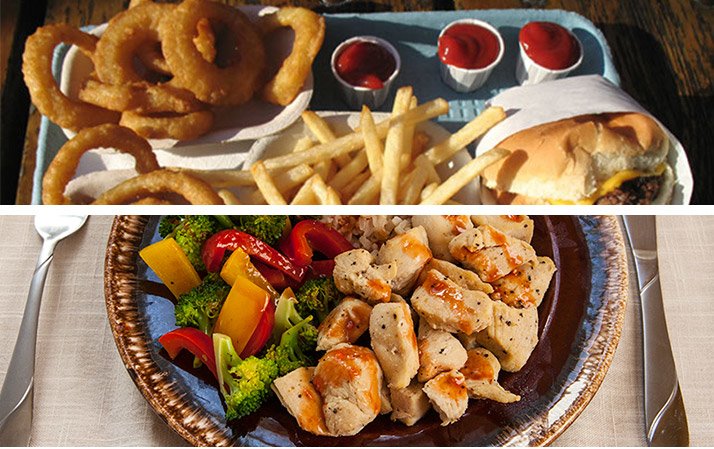
5 Ways Your Brain Is Sabotaging Your Fat Loss
Building your best body takes hard work. But hard work with the wrong mindset can actually leave you further away from where you want to be. This list is where real fat-loss progress begins!
In the quest to become lean, we obsess over minutiae. We tinker with meal timing down to the minute, or find ourselves wondering with embarrassing earnestness whether we'll achieve better results from sets of six squats rather than five. We Google "Kale or broccoli?" and angrily debate with our fellow fitness comrades over which cardio modality is the only one worth following.
There's nothing wrong with these discussions, but let's be clear: When progress halts, it's not a certain rep or vegetable that made it happen. It's usually something bigger: your mindset.
In fact, I would argue that going into any fat-loss program with the right mindset is far more important than any particular protocol you follow.
Which of the following fallacies are holding you back right now?
Fallacy 1 Anything less than perfect is not enough
Voltaire had it right all the way back in the 1700s when he wrote, "The best is the enemy of the good."
Expecting pristine dietary adherence is both unrealistic and unsustainable. In an ideal world, you'd have no problem nailing your diet. The stars would align, willpower would be infinite, and both family and friends would be relentlessly supportive of your goals.

But this is life. Circumstances are rarely ideal, and even when they are, it doesn't last long. You get tired and stressed, your motivation gets zapped, and Grandma insists that you have another slice of her homemade apple pie. When your only options are "perfection or bust," you're left with a whole lot of unknowns when you inevitably deviate from your nutrition program.
Instead of seeing that slice of pie as a sign of failure—and then finishing off the rest of the pie and whatever else is within arm's reach—change your perspective. How is this a learning opportunity? How were you feeling emotionally and physically when you succumbed? Did you let yourself go too long without food? Had you just had a fight with your significant other? Were you just coming from home a difficult day at work? All of these things matter, and understanding why a setback occurred will help you have a preventative strategy next time.
Remember: You're always just one meal away from getting back on track.
Fallacy 2 You have endless willpower
Why is it that those cookies are so easy to resist during the daytime, but at night, they become all you can think about?
It's simple. Willpower is finite, meaning we only have a certain amount of it to use each day. Things like work, relationships, and following a diet—particularly one where you're in a pronounced caloric deficit—all make withdrawals from your willpower.

If you're having a conflict with your boss, that's going to make it more difficult for you to adhere to your diet. As you deal with an annoying neighbor, the ice cream sitting in your fridge sounds increasingly enticing. All of these factors, when combined with your bland daytime diet of chicken, brown rice, and broccoli, can become incredibly draining—even aggravating. By the time nighttime rolls around, your inhibitions may go out the window.
So who's the villain? Probably your bland meal. If you find that you're white-knuckling your way through your diet, you're going to—perhaps unintentionally—sabotage your own progress at some point. So take a good, hard look at what you're eating. Hate broccoli? Then find a veggie you do like. And if the thought of microwaved fish makes you sick, don't eat it!
The easier a journey feels, the more sustainable it is. And the more sustainable the journey, the more likely you'll be to maintain the results.
Fallacy 3 Body transformations happen fast
Trainers should come equipped with T-shirts that read, "It took you a long time to get where you are, so don't expect to change it overnight." Then again, if they did, nobody would actually hire a trainer, because in my experience, nobody likes hearing that sentence.
Why is slow progress such a bad thing? I wonder this all the time. People get impatient because it appears that no amount of success is ever enough. You lost one pound this week. But why not five? You lost half an inch off your waist. Why not two?
Listen, there's absolutely nothing wrong with slow progress. In fact, I would argue that inching toward your goal is better than racing toward it. You'll appreciate it more, earn it more, and definitely be able to hold on to it longer.

This is particularly true when it comes to fat loss, where fast progress typically means an extreme approach. Maybe it's extremely low calories, spending 15 hours a week in the gym, or both. Whatever the case, you're setting yourself up for failure because:
- You'll lose precious muscle tissue
- You'll run yourself into the ground, risk injury, and feel awful
- Any progress you make will come to a screeching halt soon enough
- You'll get so sick of your diet and exercise that you'll completely give up and undo all the good you've done
Slow progress, on the other hand, is usually the result of a more moderate approach. Your time in the gym is somewhere between 3-8 hours a week, your calories are as high as possible while still allowing you to make progress, and you don't treat your favorite foods like they're an archenemy.
Never forget that quality of life matters. If you've lost your social life, your workout quality is suffering, and even your relationship with your partner has taken a hit, is it really worth it? No! So don't be afraid to take it slow. The gym isn't going anywhere, and there's more than enough asparagus to go around.
Fallacy 4 You think of this as a short-term gig
Do you have a plan for after your diet is over? Do you know how you're going to wean yourself off of your caloric deficit?
If the answer is "yes," nice work. These are not things that an everyday dieter considers. Usually, they're too focused on the next three weeks or two months—you know, until they "go back to normal"—that they fail to take into account the fact that they still have to deal with the post-diet period of their life, aka, the rest of their life.

As soon as the diet's done, they think they can simply go back to the way they lived before: sitting on the couch, letting their gym membership accrue dust, eating cheeseburgers on the regular. And lo and behold, they're shocked when their hard work gets all but undone in a matter of weeks.
Don't let this be you. Know how you're going to maintain your results!
Find ways to make exercise enjoyable. If that means signing up for weightlifting in a group setting, then do that. If that means one-on-one private sessions, go sign up for them. Maybe it means dabbling in powerlifting, kettlebells, strongman, Olympic lifting, team sports, running, rucking, climbing—whatever strikes your fancy, go for it!
Along the way, make sure that most of the food you're eating is stuff you actually like. If it's not clear by now, mastering this type of eating is a skill, so cultivate it like one! You should be able to keep it up long after the diet is done.
Fallacy 5 Losing fat needs to be a continuous process
Losing fat is a respectable goal, but that doesn't mean it's an appropriate aspiration at all times of your life.
Let's face it: A successful diet demands lots of commitment. Plenty of your time ends up getting directed toward simply getting in your workouts and nailing your nutrition. But the truth of the matter is, most of us have other balls to juggle as well. Maybe you've got an incredibly demanding job—whether it's a desk job or as a stay-at-home mom—that leaves you with barely enough room to breathe. Or perhaps you're dealing with a stressful situation in your personal life.

How much do you have on your plate? Be honest with yourself. Can you really see yourself committing to fat loss—which is undoubtedly an added stressor—when you're just barely keeping yourself above water?
If life is pulling you every which way, don't hesitate to put fat loss on the shelf for a while. It doesn't mean you have to stop training altogether, or that you're giving up on health in general. Just give your body some extra sustenance, focus on recovery, and try to maintain your current shape for the time being. Circle back when you have the bandwidth, and you'll set yourself up for lasting success!
